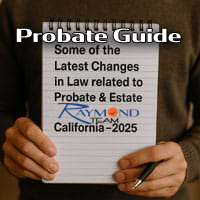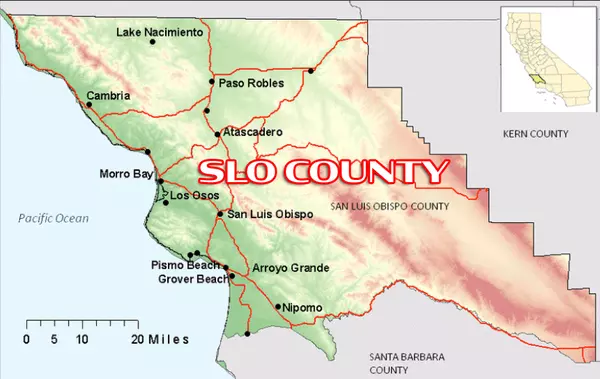Probate San Luis Obispo county Arroyo Grande Nipomo Morro Bay

Probate • Sellers & Buyers • California Central Coast
Probate Real Estate on California’s Central Coast: A Seller & Buyer Guide with the Raymond Team
Probate real estate doesn’t have to be confusing. The Raymond Team guides personal representatives and buyers through authority checks, pricing, marketing, offer terms, and—if needed—court confirmation and overbids, so you close with clarity and confidence.
The Raymond Team Advantage in Probate
Specialized workflow
Agent–attorney coordination, timeline control, and document checklists designed for probate.
Court‑ready pricing
Hyper‑local comps + condition analysis + buyer psychology to defend value in court or NOPA.
Serious‑buyer marketing
Discreet pre‑launch, compliant public launch, and clear overbid guidance to drive qualified demand.
Transaction control
Escrow, notices, vendor access, occupancy, insurance, and closing prep—kept on schedule.
For Sellers (Personal Representatives, Heirs, Trustees)
1) Confirm Authority & Scope
- Letters Testamentary/Administration establish who can act.
- IAEA Authority (Full vs Limited) determines whether court confirmation is needed.
- Attorney alignment: We sync counsel instructions with your listing/offer plan.
Deliverables: Authority review checklist, tailored disclosures, timeline map (valuation → launch → offer acceptance → closing).
2) Valuation That Holds Up
We present two paths: market‑forward pricing to maximize interest, and overbid‑aware pricing positioned for possible court confirmation.
3) Marketing & Compliance
- Pro photos, floor plan, targeted syndication, and buyer education about probate terms.
- Clear language on as‑is condition, timelines, and overbid rules (if applicable).
- Private showings coordinated around occupant and vendor schedules.
4) Offer Management (IAEA Full vs Limited)
- Full Authority: Often no court confirmation; use of Notice of Proposed Action (NOPA) when required by counsel.
- Limited Authority: Accept best offer subject to court confirmation; prep for potential overbid at hearing.
5) Court Confirmation & Overbidding (When Required)
- Coordinate with counsel on hearing date, buyer presence, deposit, and local overbid increments.
- Net‑proceeds modeling to compare: lock current buyer vs invite competitive overbids.
6) Closing & Estate Reporting
- Manage escrow, lien/creditor responses, insurance, utilities, and possession.
- Provide a post‑close packet for your attorney and beneficiaries.
Seller Checklist
- Letters & Authority documents
- Death certificates (per title/escrow)
- Mortgage/HOA/utility details
- Access plan (keys, occupants, personal property)
- Vendor approvals (clean‑out, repairs, staging—if allowed)
- Insurance coverage during listing period
For Buyers (How to Win a Probate Sale)
1) Know the Rules
Some sales require court confirmation; others under IAEA Full Authority may not. Expect as‑is condition and firm timelines.
2) Make a Probate‑Strong Offer
- Earnest money: stronger deposits signal certainty; some court sales require a cashier’s check before the hearing.
- Contingencies: keep them focused and short; align inspection windows with court/NOPA timelines.
- Proof of funds & underwriting: we help your lender prep a probate‑aware approval letter.
3) If Court Confirmation Is Required
- Your accepted offer becomes the baseline—others can overbid in court under set increments.
- We coach you on the math, what to bring, and how to compete.
4) Closing with Confidence
- Coordinate vesting, title requirements unique to probate, and possession.
- Set realistic expectations for timing and condition if occupants or personal property remain.
Buyer Checklist
- Lender pre‑approval tailored to probate timeline/condition
- Proof of funds ready (cashier’s check if court requires)
- Inspection team on standby for compressed timelines
- Understanding of as‑is terms and potential overbid risk
Timeline Snapshot (Typical Ranges)
- Authority issued → 1–3 weeks to list (photos, disclosures, pricing)
- Live on market → 1–3 weeks to best offer
- If NOPA or court confirmation → add 2–6+ weeks
- Escrow → 21–45 days (cash can shorten; lending/repairs can extend)
Why the Raymond Team
- Court‑ready pricing narrative that’s persuasive and defensible
- Overbid‑aware strategy to protect seller net or help buyers plan to win
- Tight vendor orchestration (clean‑outs, locksmiths, insurance verifications)
- Communication cadence: weekly status, milestone alerts, and day‑of‑court playbooks
FAQ
Do all probate sales require court confirmation?
No. With IAEA Full Authority, many sales close without court. Limited Authority or specific court orders can trigger confirmation.
Can the estate make repairs?
Sometimes—subject to authority, counsel approval, and estate cash flow. Most sales are as‑is.
How are overbids calculated?
Local courts publish rules and increments. We’ll cite your court’s current standard and run net‑proceeds scenarios.
How long does a probate sale take?
Commonly 45–90+ days from list to close, longer if court confirmation is required.
Can I use a loan to buy a probate property?
Yes—if the property qualifies and the lender can meet probate timelines and conditions.
- Decedent: The person who has died.
- Personal Representative: The person appointed by the court to manage the estate. This person is either an executor or an administrator.
- Executor: The personal representative named in the decedent's will.
- Administrator: A person appointed by the court to manage the estate if the decedent died without a will.
- Beneficiary: An individual or organization that inherits property through a will or trust.
- Heir: A person who inherits property when there is no will, according to California's laws of intestate succession.
- Devisee: A person named in a will to receive a portion of the estate.
- Interested Person: A broad term for anyone with a financial right or claim against the estate, including heirs, beneficiaries, and creditors.
- Trustee: The person or institution named in a trust to manage the trust's property for the beneficiary.
- Custodian: A person appointed to manage and dispense funds for a minor under the Uniform Transfers to Minors Act.
- Decedent's Estate: All of the real and personal property owned by the person who died.
- Will: A legal document that specifies a person's wishes for distributing their property after death. A will is subject to probate.
- Holographic Will: A will that is entirely handwritten, dated, and signed by the person writing it.
- Intestate: The term for a person who dies without leaving a valid will. In this case, the distribution of assets is determined by state law.
- Testate: The term for a person who dies with a valid will.
- Intestate Succession: The legal process that determines how a decedent's property is distributed to heirs when there is no will.
- Trust: A legal arrangement where a trustee holds property for the benefit of another person. A living trust can help avoid probate.
- Codicil: A document that amends or supplements an existing will.
- Letters Testamentary/Letters of Administration: Court-issued documents authorizing the personal representative to act on behalf of the estate.
- Assets: Property within the estate that has value, such as real estate and personal property.
- Real Property: Buildings and land.
- Personal Property: Moveable items such as cash, vehicles, jewelry, and furniture.
- Liability: Debts or obligations that must be paid from the estate.
- Creditor's Claim: A formal demand by a creditor for payment of a debt owed by the decedent.
- Independent Administration of Estates Act (IAEA): A California law that allows a personal representative to administer most aspects of an estate with limited court supervision.
- Contested: The term for a case where parties introduce evidence to dispute an adverse claim, such as contesting a will.
- Non-probate assets: Assets, like those held in a trust, joint tenancy, or with a payable-on-death beneficiary, that are distributed outside of the probate process.
- Ancillary Probate: A secondary probate proceeding required in California if a non-resident of the state owned real property there.
- Summary Probate: A simplified, less formal probate procedure available for small estates that meet certain value thresholds.
- Probate Litigation: Lawsuits that challenge a will, trust, or the actions of a fiduciary.
Helpful external reference: San Luis Obispo Superior Court (Probate Division). For Santa Barbara County, see Santa Barbara Superior Court.
© Raymond Team Real Estate. This article provides general information, not legal advice.
Categories
- All Blogs (25)
- Best Real Estate Agent on the central Coast (9)
- Buyers Guide (4)
- Cambria, Templeton, Pismo Beach, Paso Robles, Nipomo (21)
- downsizing (4)
- Eco Friendly (1)
- Investing Green (2)
- Market Analyst (2)
- Probate and Trust (3)
- Prop 19 (1)
- relocations (5)
- San Luis Obispo Home Sales 2025 (5)
- San Luis Obispo, Pismo Beach, Arroyo Grande, Grover Beach, Avila Beach, Morro Bay, (23)
- selling to move (10)
- SLO Market (5)
- Solar (1)
- Top Agents on the central coast (4)
Recent Posts











